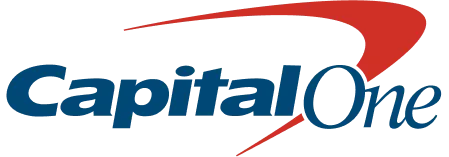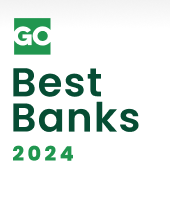CDs, also known as certificates of deposit, are a great way to capitalize on your savings potential with traditional or online banks. Like a standard savings account, they are a safe investment established through a bank or credit union, but generally, CDs have higher interest rates allowing you to make more on your return and reach your short-term or long-term savings goals faster.
To determine the Best CD Accounts available on the market, GOBankingRates analyzed banks based on several factors, including:
- Total assets
- Number of branch locations
- Minimum deposit amount needed to open a CD
- 1-year CD annual percentage yield (APY)
- 60-month CD APY
- Mobile app ratings
Our Commitment to the Readers
Our editors are committed to bringing you unbiased ratings and information. Our editorial content is not influenced by advertisers. We use data-driven methodologies to evaluate financial products and companies, so that all are measured equally. You can read more about our editorial guidelines and the banking methodology for the ratings below.

20 Years
Helping You Live Richer

Reviewed by Experts

Trusted by Millions of Readers
Compare the Best CD Rate Accounts
Account
Best For
12-Month CD APY
60-Month CD APY
Min. Deposit
Learn More
GOBankingRates Best CD Rate Accounts

Best for rENEWAL BONUS RATES
Ally Bank

12-Month CD APY
60-Month CD APY
Minimum Deposit
$0
WHY WE LIKE ALLY BANK
On the website for Ally Bank’s high-yield CD account, the slogan reads, “Saving your money is great. Growing it is even better” — and with high APYs across terms, we think this CD will help customers plant the seeds toward long-term growth.
We like the flexibility of these high-yield CDs, with terms ranging from three months to five years. The Raise Your Rate CD comes in two- and four-year terms, with an option to increase your rate once during a two-year term and twice during the four-year term. There’s no minimum balance to open an account, making this high-yield CD accessible for more customers than other banks. Better yet, Ally Bank doesn’t charge maintenance fees for your CDs, giving it another advantage.

Best for a range of COMPETITIVE Rates
Barclays Bank

12-Month CD APY
60-Month CD APY
Minimum Deposit
$0
WHY WE LIKE BARCLAYS BANK
It’s rare to find CD options that have both high rates and no minimum deposit requirements. This is only one of the reasons we like Barclays Bank and its CD account offerings. It has a variety of term lengths and a range of above-average APYs.
Barclays Bank is not only competitive for CDs with other banks and credit unions but also other online-only financial institutions. We like it for its high-yield options, but be aware it does not offer the same products as other competitors, such as checking accounts. Though it may not be a one-stop shop for banking, it’s a good choice to earn more on your savings.

Best for high long-term apys
BMO Alto

12-Month CD APY
60-Month CD APY
Minimum Deposit
$0
WHY WE LIKE BMO ALTO
There’s a nearly endless list of great things to like about BMO Alto’s high-yield online CDs, which receive top honors from GOBankingRates as some of the Best CD Accounts of 2024.
Customers who bank with BMO Alto enjoy no minimum balance when opening a CD and pay $0 in a minimum opening deposit with interest paid monthly. Customers may select the fixed term that suits their needs the most. Pick from six available fixed terms, ranging from six months to 60 months.

Best for BIG BANK WITH HIGH APY
Capital One

12-Month CD APY
60-Month CD APY
Minimum Deposit
$0
WHY WE LIKE CAPITAL ONE
Capital One may be a younger bank than many of its competitors, but its ambitious, forward-thinking approach makes its online 360 CD account a solid bet for consumers who are just as future-minded.
The Capital One online 360 CD comes with a range of competitive annual percentage yields. Customers enjoy the security of knowing that all 360 CD balances are insured up to the FDIC’s allowable limits. The performance of your CD isn’t linked to market variability, which is frankly enough peace of mind to make Capital One a safer bet to house your online CD. Why take risks with the money you want to use for that down payment, college fund or new car when Capital One offers you greater security?

Best for WEBSITE TRANSPARENCY
Discover® Bank, Member FDIC

12-Month CD APY
60-Month CD APY
Minimum Deposit
$2,500
WHY WE LIKE DISCOVER BANK
Discover Bank offers CD accounts for a wide range of terms, spanning from three months to 10 years. The APYs vary depending on the term length — the 12-month CD, in particular, boasts an impressive APY.
With so many term options available, it’s likely that Discover Bank has a CD option that works for your individual timeline. It is worth noting, however, that the minimum balance requirement is among the highest among the winners in the Best CD Accounts category, so it’s not ideal for those looking to invest lower amounts.

Best for 9-month rate
EverBank

12-Month CD APY
60-Month CD APY
Minimum Deposit
$1,000
WHY WE LIKE EVERBANK
With 10 different term lengths to choose from, EverBank offers a CD option that will fit anyone’s timeline. APYs are competitive, though not the highest in the category, while the minimum deposit required also falls in the middle of the pack.
Standout features include no monthly maintenance fees, a 20-day advanced maturity alert, automatic renewal at maturity and an interest withdrawal option at opening.
If you’re looking for a CD option that fits your timing needs, EverBank will likely have you covered, which is why it’s a winner in this category.

Best for HIGH INTEREST RATES
LendingClub Bank

12-Month CD APY
60-Month CD APY
Minimum Deposit
$2,500
WHY WE LIKE LENDINGCLUB BANK
It’s hard to compete with LendingClub Bank’s CD rates, so if you have been debating opening an account, now is the time. We like these CDs as there are no monthly fees and a variety of terms to choose from, which range from six months to five years.
Though there is a high opening deposit requirement when you open a CD, each term length option offers competitive rates to help your savings earn more. LendingClub Bank CDs always remain competitive, which means you can achieve your financial goals faster.

Best for Short-term rates
Marcus by Goldman Sachs, Member FDIC

12-Month CD APY
as of Apr. 23, 2024
60-Month CD APY
as of Apr. 23, 2024
Minimum Deposit
$500
WHY WE LIKE MARCUS BY GOLDMAN SACHS
With a variety of CD options, such as high-yield, no-penalty and rate bump, it is no wonder we like Marcus by Goldman Sachs for its CD accounts. You can find the right financial fit for you, as the term lengths range from six months to six years.
Whether you want to lock in a rate for longer or still have access your money without risking early withdrawal penalties, Marcus by Goldman Sachs has the right account for you. Its returns on shorter-term CDs are especially attractive and will benefit investors who need access to their money sooner rather than later.

Best for 15-month cd
Synchrony Bank

12-Month CD APY
60-Month CD APY
Minimum Deposit
$0
WHY WE LIKE SYNCHRONY BANK
Synchrony Bank’s CDs appeal to people with a lower risk tolerance who want to earn a predictable, comfortable rate on their money without fear of market whims.
Its 12-month CD, like all of its CDs, has no minimum balance requirement, and you can even request a rate increase. The bank’s variety of CDs make Synchrony an excellent choice for putting your money where it can earn in a safe and stable way.

Best for 1-year cd
Zions Bancorporation, N.A.

12-Month CD APY
60-Month CD APY
Minimum Deposit
$1,000
WHY WE LIKE ZIONS BANCORPORATION
Zions Bancorporation stands out with its variety of accounts and multiple awards from GOBankingRates in 2024. Its CD offerings are rated as some of the best around, with high APYs and a minimum deposit of just $1,000.
CDs come in terms from 30 days to five years, making them a flexible savings solution whether you’re putting money away for a vacation or to buy a home. Zions Bank also offers an IRA CD that may be tax-deferred, which is a product you won’t find everywhere.
Research Methodology
To determine rankings, GOBankingRates looked at the following factors from all banks (excluding neobanks): (1) total assets as sourced from the FDIC; (2) number of branch locations as sourced from the FDIC; (3) minimum deposit to open an account; (4) 12-month CD APY; (5) 60-month CD APY, and (6) the average mobile app rating between the Google Play (Android) and Apple app stores. All factors were then scored and combined, with the lowest score being the best. Factors (1) and (2) weighed 0.5 times, factor (3) weighed 2 times, and factors (4) and (5) weighed 4 times. All data is up to date as of April 23, 2024; rates and fees are subject to change.
What To Know About CDs
When opening a CD, you’ll determine the length of the fixed “term” that will be established — usually from three months to a number of years — and the money will be locked in for that period of time. In return, CDs offer a fixed, higher interest rate than a typical savings account, allowing a higher yield on your money.
How CD Accounts Work
A certificate of deposit, or CD, is one kind of savings account offered by banks and credit unions that offers a safe and easy way to invest and make a return on your money. Unlike traditional savings, however, it’s not a liquid account that you can easily withdraw money from when you might need it. To earn the higher interest rate, you need to leave your CD account untouched for the entirety of the term length, until it reaches maturity.
Fees and Minimums
Though fees and minimums will vary by financial institution, for the most part, CDs don’t come with monthly service fees. However, you need to wait for the account to mature. If you try to take money out before the account’s term length has been reached, you could incur an early withdrawal penalty. Most CDs do have a minimum deposit requirement to open an account.
Why You Should Open a CD Account
Not only is a CD a low-risk savings tool and investment strategy, but it is also best for those who want to increase the amount they earn in interest while keeping their money stored away without touching it. It’s a good way to get a bit more bang for your buck if you are comfortable not having access to those funds until the CD has matured.
How To Open a CD Account
Once you have decided on the right CD account for you based on the CD terms, you can open an account quite easily. Here is what you’ll need to do:
- Make sure you have two forms of identification, such as your driver’s license or passport.
- Present personal information and required documents, such as your name, address, birthday and Social Security number.
- Decide if you want the interest disbursed at the end of the term or regularly.
- Fund the account with your opening deposit.
Pros and Cons of CDs
Though CDs do have many benefits, there are some drawbacks to opening this type of savings account. Here are some key takeaways.
Pros
- Higher interest rates: One of the big benefits of a CD is that it allows a higher interest rate than a traditional savings account, as a payoff for locking your money in for the specific term. Depending on the length of CD you choose, this APY could be 4% or higher.
- Better saving capability: Because the money initially deposited into a CD cannot be touched during the remainder of its term, it prevents you from being able to make withdrawals, which would otherwise cut into your ability to save the money. When you don’t have access to the funds, they can continue to grow. This is also a great option when you have a specific financial goal or a future expense you want to prepare for.
- Guaranteed rates: Timing is everything with CDs. If you choose to open this type of account during times of inflation, when interest rates are high, you’ll be able to lock that same rate in over the course of the term, even if inflation subsides and interest rates come down.
Cons
- No access to the funds: Though CDs have their perks, one of the big drawbacks is that you cannot touch the money until the term is complete, or you’ll incur a penalty for an early withdrawal. When you open a CD, you lock the money in the account, and this could be for a substantial amount of time, up to several years. There are some options, like liquid CDs, that do have flexibility, so you can access the money originally deposited, but these accounts don’t have the high interest rates of the traditional options.
- Rates are locked in: As mentioned, timing is everything with CDs. If you are savvy and open an account during times of inflation when interest rates are high, you’ll be able to secure an ideal APY. But, if you open a CD when rates have leveled out, you won’t be able to take advantage of higher interest if those rates jump up over the course of the term.
- Earning potential: While CDs earn interest at a higher rate than a regular savings account, there are other investment options that have even greater yields, such as securities and stocks. However, CDs are generally a safer, less volatile investment.
Types of CDs
Under the umbrella of certificates of deposit, there are a number to choose from, all offering their own terms and advantages:
- Traditional: This is the standard CD method, where you contribute a particular dollar amount that stays locked in the account for a predetermined amount of time. It’s ideal if you know what you want to contribute ahead of time and won’t need to take early withdrawals. It also offers the highest interest rate of the various forms of CDs.
- No penalty: Also known as a liquid CD, this option does have more flexibility, allowing for withdrawals before the maturation date of the savings plan without a penalty. However, the financial institution may still impose a waiting period before you take out money. Also, they might not let you take out a percentage but rather mandate you have to take out the full amount, which means you won’t be able to earn on the original deposit. The interest rate for a no-penalty CD will be a bit lower than a traditional CD.
- Bump-up: The advantage of this type of CD is that you are allowed to ask the bank to raise your interest rate during the term. This can be useful if you think interest rates will rise during the months or years you have specified for the CD, such as during a period of high inflation. Choosing this option may provide the chance to get more interest over time, but it also means a lower interest rate at the start of the term.
How To Choose a CD Account
The terms of a CD are the length of time you commit to keep your funds in the account. When you open a CD, you’ll choose the “term,” or length of time you are locking in the money before it’s vested. Typical CDs offer 3-month and 6-month terms, as well as terms of one, three and five years.
Be aware that you do not have access to the money in your CD account until the account reaches maturity. This means you can’t withdraw funds earlier than the term length without incurring early withdrawal penalties.
Alternatives to CD Accounts
There are several factors to compare when choosing whether a CD or another bank account is best suited for you.
CDs vs. Traditional Savings Accounts
The main difference between savings accounts and certificates of deposit, or CDs, is the amount of access you have to the funds in the account. Where standard savings accounts allow you immediate access to your account balance, when you put your money in a CD, you agree to the CD term, which is the time your CD will take to mature.
Withdrawing funds from a CD before maturity can result in early withdrawal penalties. CDs do tend to earn more interest, so these accounts are better for those who can leave their money in the account for an extended time period without touching it.
CDs vs. High-Yield Savings Accounts
High-yield savings accounts allow account holders to earn significant interest on their balance and are good to grow an emergency fund. CDs, though they operate similarly, are better to possibly save for a large purchase down the line, as you can’t access the funds until the CD has matured.
CDs vs. Money Market Accounts
A CD differs from a money market account in that the money market account has checking account features, such as the ability to write check or link a debit card. A CD is a time-deposit account, and a money market account isn’t, so it generally pays less than a CD. This is because a CD requires you to keep your balance in the account for a set period of time. This is known as the CD term.
CDs vs. Bonds
CDs and bonds are both considered safe-haven investments that yield higher returns than a standard savings account. However, when interest rates are high, as they currently are, CDs may be a better option, which also works in the reverse — bonds are preferable when interest rates are low. Interest rates impact which of these will be the higher-paying investment.
CDs and Taxes
Anytime you earn money, you should always be aware of the tax implications. Here are some answers to frequently asked questions about CDs and taxes.
Are You Taxed When a CD Matures?
Short-term CD income, typically 12-month terms or less, is taxed at maturity. This can be used to defer taxable income from year to year. Keep this in mind when you are trying to figure out your annual income. Income from CDs with terms over 12 months is taxed as it accrues.
Are CDs Taxed at the End of a Term?
The interest you earn with a CD is considered taxable interest as defined by the IRS. If you earn any amount over $10 during the term of your CD, you’ll receive a Copy B of Form 1099-INT or Form 1099-OID that you’ll need to report when you file your tax return.
Does Cashing a CD Count as Income?
If you cash a CD when it reaches maturity, it is taxed on the interest you’ve earned. However, if you cash out before the account reaches maturity, you need to report the interest accrued to that point as taxable income. You can deduct any penalty charged by the bank, and the return of the principle is a nontaxable return of capital.
CD Rates and the Federal Reserve
Though a savings account typically has a variable rate, a CD account has a fixed interest rate, which means the rate won’t fluctuate with the Fed rate of the Federal Reserve. If you have not opened a CD account yet, be aware that the already rising rates are predicted to continue to increase in 2024.
When the Federal Reserve raises rates, it affects everything from national averages to individual account rate increases. It is often good to lock in a solid fixed APY when you see one.
Caitlyn Moorhead and Nicole Spector contributed to the reporting for this article.
Recap of Winners
- Ally Bank – Best for Renewal Bonus Rates
- Barclays Bank Delaware – Best for Range of Competitive Rates
- BMO Alto – Best for High Long-Term APYs
- Capital One – Best for Big Bank With High APYs
- Discover Bank – Best for Website Transparency
- EverBank – Best for 9-Month Rate
- LendingClub Bank – Best for High Interest Rates
- Marcus by Goldman Sachs – Best for Short-Term Rates
- Synchrony Bank – Best for 15-Month CDs
- Zions Bancorporation – Best for 1-Year CDs
FAQ
Although the basic idea behind a CD account can be simple to understand, there are still many common questions surrounding them. Here are the answers to some of the most frequently asked questions regarding CD accounts.- Where can I earn 5% on a CD?
- Though rates will vary throughout the year and by location, here are several banks where you can currently get locked into a 5% APY or higher on your CD:
- Barclays Bank
- BMO Alto
- Capital One
- EverBank
- LendingClub Bank
- Marcus by Goldman Sachs
- Synchrony Bank
- Though rates will vary throughout the year and by location, here are several banks where you can currently get locked into a 5% APY or higher on your CD:
- Are CDs a safe investment?
- Generally, yes. Like regular savings accounts that you open at a bank or credit union, CDs are protected under the provisions of the government-led Federal Deposit Insurance Corporation or National Credit Union Administration, as long as you don't exceed the insured amount, which is $250,000 per person, per bank. And because the CD is a straightforward investment, rather than investing in stock market shares, there is less risk involved.
- Is it worth putting money in a CD right now?
- Now is a great time to take advantage of the increased interest potential with a CD. However, one of the biggest disadvantages of a CD is that your money is locked until the term of the CD is over. So if you invested $1,000 and chose a three-year CD, you will not be able to withdraw any of the original $1,000 until that three-year term is over without incurring a financial penalty.
- Can you get 6% on a CD?
- Generally, no. You can find 6% CD rates at a few banks or financial institutions, but chances are, those rates are only available on CDs with maturities of 12 months or less. Interest rates for CDs tend to fluctuate between 0%-5% based on the health of the economy.
- What is considered a good CD rate?
- Though rates do fluctuate depending on your account and bank, in general, anything over 4.50% APY is considered above average.
- Can you lose money on a CD?
- No, you cannot lose money on a CD – as long as you don't touch the funds until after the CD has matured. If you make an early withdrawal, the penalties could eat into the interest you have earned.
- What is CD laddering?
- A CD ladder is a strategy, advised by financial experts, to open multiple CDs at once and stagger the terms and deposits so that you can have access to some of the money sooner and avoid getting stuck in one long-term CD if interest rates begin to rise. So, rather than investing $3,000 in one long-term CD, you might choose to put $1,000 in a six-month CD, $1,000 in a one-year CD and $1,000 in a three-year CD to capitalize on investments while also having access to vested money sooner.
- How much does a $10,000 CD make in a year?
- What you make in interest on a $10,000 CD a year depends on the APY the account earns. For example, if you earn an APY of 6%, you would earn $600 interest.



 Written by
Written by  Edited by
Edited by 












